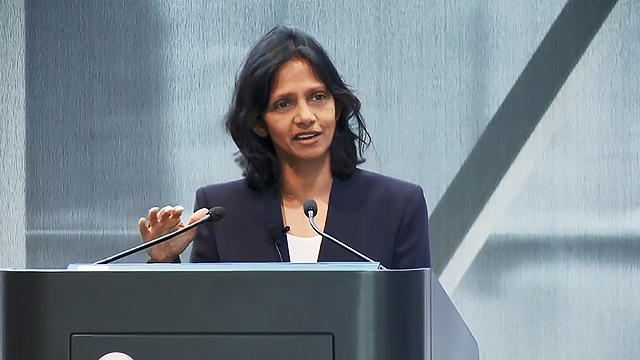Last week, during the United Nations Climate Action Summit in New York, Macquarie Group Managing Director and CEO Shemara Wikramanayake announced a series of new commitments intended to accelerate action against climate-change.
They include development of a 20 GW pipeline of renewable energy projects over the coming five years through Macquarie’s Green Investment Group (GIG), and commitment to the RE100 corporate leadership initiative, which will see the company source all the energy supplying its premises and data centres from renewable sources by 2025.
“We are increasingly broadening our focus by seeking new solutions to emissions reduction across agriculture, waste and real estate and working to ensure our infrastructure investments are more climate resilient,” said Wikramanayake in a statement on Wednesday.

Image: Macquarie Group
In the same statement, Macquarie said it is building on its “long track record of investing in renewable energy projects”. Its own investments since 2010 and its acquisition of GIG in 2017 have contributed to more than 22 GW of renewable generation capacity, utilising more than $8 billion of direct and arranged finance.
Of the intended 20 GW pipeline of new renewables projects, around 20% are expected to be in “in non-OECD emerging market countries where climate finance flows have historically been weaker”, said the Macquarie statement.
GIG intends to arrange financial backing for many of the pipeline projects via power purchase agreements through Macquarie corporate clients. Macquarie has already raised $1 billion of share capital via an institutional placement in August this year.
Primary industry the next carbon frontier
In addition, Macquarie Infrastructure and Real Assets (MIRA) infrastructure manager, is approaching final close on its most recent agricultural fund of $1 billion, which aims to improve on-farm energy efficiency and reduce carbon emissions in one of the world’s most carbon-intensive industries.
“Over the past decade, we have played a leading role in facilitating the shift towards renewables,” said Wikramanayake, “with a particular focus on trying to address the various challenges that remain to full transition”.
Australia’s Clean Energy Finance Corporation (CEFC) is an investor in the MIRA agricultural fund, and is working with Australia’s scientific institution, CSIRO, to develop an emissions-reduction benchmarking model that will enable the farming sector to work towards emissions intensity targets consistent with the Science Based Targets — a global industry program initiated to support the COP21 Paris Agreement.
Comparable corporate carbon reporting and green-impact data
Among other data-based initiatives, MIRA announced that it will introduce carbon and energy reporting for the portfolio of companies in its fund.
“These metrics will enable MIRA to make better investment and asset management decisions and, over time set future targets for the businesses within each fund portfolio to achieve a net reduction in greenhouse gas emissions,” Macquarie stated.
Such reporting will both hold portfolio companies accountable, and credit their initiatives and foresight in contributing to climate-change mitigation.
On the renewable-assets side, GIG’s Carbon Score methodology will be merged with Bloomberg New Energy Finance renewable-energy project data to create a green-impact assessment tool to improve understanding of how over 40,000 global solar and wind assets are impacting emissions.
All power to renewable-energy PPAs
In becoming a signatory to the RE100 — an initiative which supports and celebrates companies that commit to being 100% powered by renewables — Macquarie will enter into power purchase agreements that support development of new renewable energy projects to supply electricity for its new Sydney headquarters and Melbourne office.
In January, Macquarie became one of the founders of the Climate Finance Leadership Initiative (CFLI), which was established by Michael Bloomberg, the UN Secretary General’s Special Envoy for Climate Action, and includes chief executives of companies such as Allianz, Enel and HSBC, and the CIO of Japan’s Government Pension Investment Fund.
Collectively, the CFLI has committed to deploy US$20 billion of emerging-market climate finance by 2025.
This content is protected by copyright and may not be reused. If you want to cooperate with us and would like to reuse some of our content, please contact: editors@pv-magazine.com.









3 comments
By submitting this form you agree to pv magazine using your data for the purposes of publishing your comment.
Your personal data will only be disclosed or otherwise transmitted to third parties for the purposes of spam filtering or if this is necessary for technical maintenance of the website. Any other transfer to third parties will not take place unless this is justified on the basis of applicable data protection regulations or if pv magazine is legally obliged to do so.
You may revoke this consent at any time with effect for the future, in which case your personal data will be deleted immediately. Otherwise, your data will be deleted if pv magazine has processed your request or the purpose of data storage is fulfilled.
Further information on data privacy can be found in our Data Protection Policy.